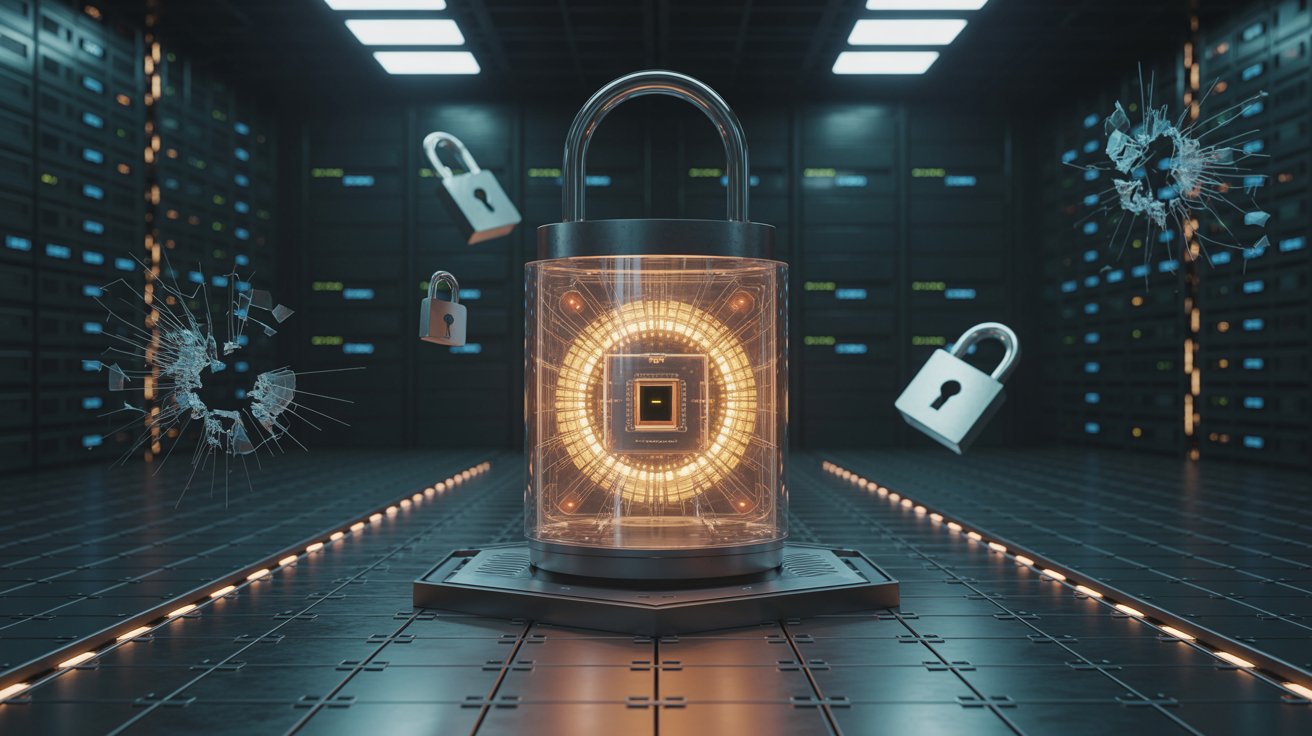
July 14, 2025
Post-Quantum Crisis: Encryption Collapse Is Coming
A Future Where Secrets Don’t Stay Secret
Imagine a world where every encrypted email, private message, financial record, or classified file—once thought secure—is suddenly readable.
Not by a hacker, but by a new kind of machine.
That’s the looming threat posed by quantum computing, a rapidly advancing field that could render today’s encryption obsolete overnight.
We’re heading toward a post-quantum crisis—and most of the internet isn’t ready.
The Heart of the Problem: Broken Math
Modern encryption relies on hard math problems. Things like:
- Factoring huge numbers (RSA)
- Solving discrete logarithms (Diffie-Hellman, ECC)
These are computationally infeasible for classical computers. They’d take centuries to crack.
Quantum computers, however, can solve them in minutes.
Thanks to algorithms like Shor’s and Grover’s, quantum systems promise exponential speedups for breaking widely used cryptographic standards.
Once they’re powerful enough, they won’t just decrypt new messages.
They could retroactively break any encrypted data previously intercepted and stored.
Harvest Now, Decrypt Later
This is the most chilling part of the threat.
Adversaries—state or criminal—can harvest encrypted data today, store it, and decrypt it years later when quantum computers mature.
That includes:
- Personal messages
- Intellectual property
- Medical records
- Legal documents
- Government communications
Even if you feel safe now, future decryption is inevitable unless your data is post-quantum secure.
What Is Post-Quantum Cryptography?
Post-quantum cryptography (PQC) refers to encryption algorithms that are designed to resist quantum attacks.
These aren’t just stronger versions of current tools. They’re completely different mathematical structures, often based on:
- Lattices
- Hash functions
- Multivariate polynomials
- Code-based encryption
Unlike RSA or ECC, these aren’t vulnerable to quantum shortcuts.
But here’s the issue: they’re not yet widely adopted. And most systems still rely on pre-quantum protocols.
The Internet Is a House of Cards
Think about how much of modern life depends on encryption:
- Browsing (HTTPS)
- Banking and payments
- Cloud file storage
- Messaging apps
- Blockchain and smart contracts
- Identity verification
- Secure logins and two-factor auth
All of these rely on encryption protocols that quantum computers are designed to break.
Unless rebuilt, this architecture will collapse like a house of cards under quantum pressure.
Platforms Must Act Now—or Regret Later
Here’s where it gets urgent: quantum readiness isn’t just a tech upgrade. It’s a trust upgrade.
Platforms must:
🔒 1. Adopt Post-Quantum Standards
Wherever possible, replace or hybridize vulnerable cryptographic components.
New protocols are emerging. Early adoption is possible—and necessary.
🕵️ 2. Map All Cryptographic Dependencies
Most platforms have dozens (if not hundreds) of legacy encryption layers, buried deep in systems.
They must audit every single one. Ignorance is not an excuse.
📦 3. Encrypt with Forward Secrecy
To reduce the risk of future decryption, use systems that don’t store session keys and implement ephemeral encryption, which limits long-term exposure.
🚫 4. Avoid Storing Sensitive Encrypted Data Unnecessarily
If you don’t need it, don’t keep it. Every encrypted file stored today is a target tomorrow.
Blockchain Will Be Hit Hard
Blockchains were designed to be immutable and trustless. But they’re built on cryptography that quantum computing can shatter.
Public keys exposed in transactions could be reverse-engineered into private keys—meaning wallets drained and chains corrupted.
Quantum-secure blockchain protocols are in development, but most networks today remain dangerously exposed.
A False Sense of Security
The biggest danger isn’t quantum computers themselves.
It’s the false confidence in current security systems. Most users—and developers—believe their encryption is strong enough.
It’s not.
Even if quantum hardware takes another decade to reach scale, the software crisis has already begun.
Preparation takes time. Updating protocols, rebuilding systems, coordinating transitions—these things require years, not weeks.
How Close Are We, Really?
Quantum computers powerful enough to break RSA-2048 don’t exist yet.
But recent breakthroughs show it’s no longer a fantasy. Progress is exponential. Once a stable system hits critical qubit count and error correction, the quantum tipping point may come faster than expected.
And remember: it only takes one capable machine to start the collapse.
What Individuals Can Do
You may not run a platform, but you still have agency.
✅ Use end-to-end encrypted services that update regularly
✅ Favor providers experimenting with post-quantum protocols
✅ Avoid uploading ultra-sensitive data to services with unknown encryption standards
✅ Advocate for transparency in encryption policies
Demand platforms disclose whether they’re post-quantum ready. Privacy shouldn’t be a guessing game.
Post-Quantum Doesn’t Just Mean Stronger—It Means Smarter
It’s not about having “bigger keys.” Post-quantum security means rethinking trust from the ground up.
That includes:
- Eliminating central points of failure
- Designing for resilience under future attack models
- Creating tools that can upgrade without massive user disruption
Security in the quantum era must be modular, adaptable, and built to evolve.
Ethical Implications of the Quantum Arms Race
Quantum technology has immense potential for good—new medicines, materials, insights.
But its dual-use nature makes it a weapon in the wrong hands.
If only privileged entities have quantum decryption tools, it creates a surveillance elite—able to see what others cannot.
We must ensure post-quantum security is:
- Publicly available
- Openly audited
- Equitably distributed
Otherwise, the encryption collapse won’t just be technical—it will be democratic.
Final Thought: Trust Is Fragile, and the Clock Is Ticking
Quantum computing will break more than math. It will break assumptions.
The assumption that your secrets are safe.
That your identity is protected.
That encrypted means invisible.
Those assumptions are already outdated.
But we can act. We can build systems that protect people not just today, but tomorrow.
Because trust isn’t just a feeling—it’s a feature. And in the post-quantum world, it will be the rarest commodity of all.
💬 Is Your Data Ready for the Quantum Future?
What systems do you use every day that rely on vulnerable encryption?
Has your platform addressed quantum readiness?
Join the discussion on Wyrloop and help build a safer digital future—before the collapse arrives.